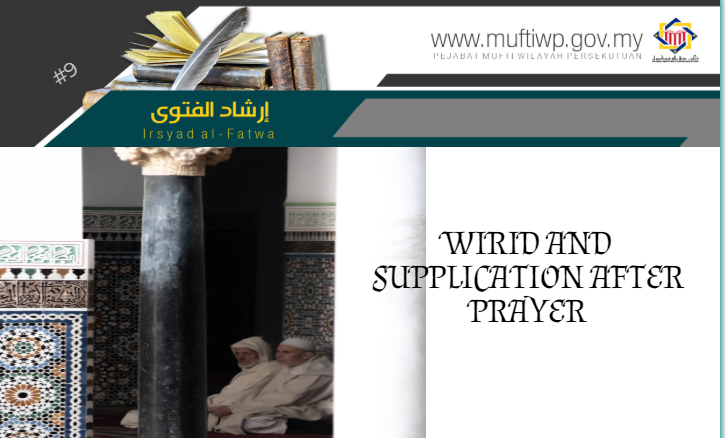Question:
I have always followed the practice of wirid (zikr) and supplication after prayer together with the imam in my village. Recently, I learned that this is not a sunnah of the Prophet PBUH and a bidaah. I would like to ask for an explanation, does Islam considers this wrong?
Answer:
Alhamdulillah, praise and thanks to Allah for the many countless blessings He has blessed us all with. Blessings and salutations to the Prophet Muhammad PBUH, his wives, his family, companions and all those that follow his teachings to the day of judgement.
In this issue there are two matters that should be understood:
First: Wirid and zikr after prayer is a sanctioned worship in Islam. It should be from the zikr of the Prophet PBUH mentioned in authentic hadiths.
The same applies to supplication after prayer, whether it is a general or specific supplication. The Prophet PBUH said:
يَا مُعَاذُ إِنِّي اُحِبُّكَ لا تَدَعْ دُبُرَ كُلِّ صَلاَةٍ، اَللَّهُمَّ أعِنِّي عَلَى ذِكْرِكَ وَشُكْرِكَ وَحُسْنِ عِبَادَتِكَ
“I love you, O Mu'adh! Never forget to say in every prayer: Rabbi a'inni 'ala dhikrika wa shukrika wa husni 'ibadatik (My Lord, help me to remember You, give thanks to You and worship You well.)"
Musnad Ahmad (22119), Sunan Abu Daud (1524) and Sunan al-Nasaie in Sunan al-Kubra (9937). Ibn Hibban (2020) and Ibn Khuzaimah (751) state it as an authentic hadith in their Sahih.
Second: Regarding performing these acts in groups and with a raised voice, then the Prophet PBUH never perform it this way. Hence, this issue is a khilaf (scholars have differing opinions about this matter) among the scholars, as to whether it is a bidaah or not. Bidaah itself is divided into two; good bidaah and harmful bidaah. We are inclined towards the opinion that celebrates the custom of a certain place. For further explanation, you can refer to several other books such as al-Azkar written by Imam al-Nawawi Rahimahullah among others.
Wallahua’lam.


